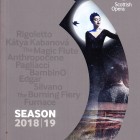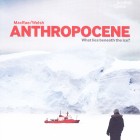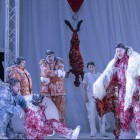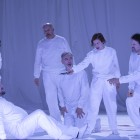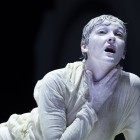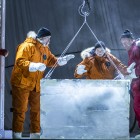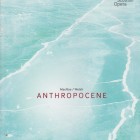Anthropocene 2019Scottish Opera
Read more about the opera Anthropocene
The combination of composer Stuart MacRae and librettist Louise Welsh has, from the start of their collaboration a decade ago, established a nice line in the macabre. This fourth piece continues that trend. The setting has nothing in common with its predecessors. The initial meaning of 'Anthropocene' is taken to be the recent or current age of geological time, in which humankind has made a marked impact on the environment.
The Arctic setting
The titular vessel, King's Anthropocene, has been specifically designed for exploration and research in extreme climatic conditions - like the Endurance or its recent successor Sir David Attenborough. For the duration of the opera it is moored in some remote northern harbour - perhaps Greenland - and as the temperature drops, the sea freezes over, and the occupants settle in, marooned for the winter.
The ship and expedition have been paid for by a leading tycoon, a multimillionaire complete with peerage, (Lord) Harry King, who is on board, along with his daughter, a photographer. King's purpose is to collect and study ice samples, in the hope of explaining early life on Earth. His ulterior motive is clearly self-glorification, and King makes it clear from the outset that he sees himself in charge. But both the Professor and the Captain have other ideas...
The other characters who take part are two academics, husband and wife, two of the ship's crew, captain and engineer, and a journalist, who is attempting to salvage his career.
Tensions emerge when the scientists discover a mysterious figure entombed in the ice - her origin remains unexplained. The interaction between these characters leads to conflict - is scientific discovery more important than human life? Indeed the climax of the first act features a murder, with retribution dealt out by the end. There are hints of Frankenstein to start, with a nod to Rite of Spring and Lord of the Flies at the end. Lots of interesting ideas, though not all the elements cohere.
What cannot be doubted is the wonderful quality of the music. MacRae's use of the orchestra is quite masterly, and shows further development since his previous opera. The soundworld is fascinating, with the ice represented by a judicious mix of high notes, including the soprano Ice figure, and percussion with deep brass. There are periodic hints of Britten and Tippett as well as Adams, but the sounds are ultimately MacRae's own, and endlessly fascinating.
Impact and atmosphere
The performance, at the second evening, was quite superb, led by Stuart Stratford's masterly laying out of the score with his orchestra. The singers were varied and full of character, projecting most of the words with ease. Jennifer France's voice is a phenomenon, effortlessly projecting her high melismas, while still maintaining a lovely, eerie, sweetness of tone.
Most of the others were relatively unfamiliar. Paul Whelan and Jeni Bern both worked with Scottish Opera early in what have been busy careers. Benedict Nelson seems to specialize in new work, and does it very well. Stephen Gadd is the only company regular. Like the other three he was able to project a sense of character that allowed us to distinguish a group of distinct individuals, albeit in identikit wilderness-wear costumes that must have been horribly uncomfortbale under the hot stage lights.
The production by Matthew Richardson, was very simple, choosing to ignore the wide open spaces of the Arctic, in favour of on-board claustrophobia. Samal Blak's simple, adaptable set worked well.
For the final two performances in London a slightly reduced orchestration will be heard.
Scottish Opera 2018/19
Scottish Opera's 2018/19 season started with the company's first full-scale staging of one of the most popular works of the verismo school in Leoncavallo's Pagliacci. This was seen in Paisley in July - an impressively large-scale production with many local performers, all in a temporarily-erected marquee. The new stagings include a world premiere, Anthropocene, an eagerly awaited further collaboration between Stuart MacRae and Louise Welsh. There is also a new Kátya Kabanová. Returning to the composition period of Pagliacci, the continuing Sunday afternoon concert series includes Scottish premieres for Puccini's second opera, Edgar, and Mascagni's fifth, Silvano. There are also major revivals, and long tours, for Matthew Richardson's staging of Rigoletto from 2011 and Sir Thomas Allen's of The Magic Flute (2012).
Stuart MacRae and Louise Welsh
The creative partnership of composer Stuart MacRae and librettist Louise Welsh has developed into the most successful and enduring team to emerge from Scottish Opera's enterprising 5:15 event a decade ago. Over three seasons, groups of fifteen-minute operatic scenes were premiered, trying out various combinations of composers and writers.
The first MacRae and Welsh work, Remembrance Day, an excellent short piece, was succeeded in 2012 by a more substantial single act in Ghost Patrol. This is a satisfying blend of thriller and human drama, with a bit of PTSD thrown in. Their development continued with a full-length opera, The Devil Inside, derived loosely from a short story by Stevenson.
Performance Cast
- Harry King a wealthy entrepreneur, backer of the expedition
- Professor Prentice a scientist, the expedition leader
- Captain Ross Commander of the 'King's Anthropocenr'
- Vasco ship's engineer of the 'King's Anthropocene'
- Daisy a photographer, daughter of Lord King
- Miles a journalist
- Charles a scientist, Professor Prentice's husband
- Ice
